#bear in mind that im trying to answer this without bias from speculation - yk the theory about metatron being behind
Explore tagged Tumblr posts
Note
Fair enough! There's certainly no definite evidence, you can totally read it differently, but I don't think the trauma interpretation, unless you're trying to, wrongly, claim Hard Canon Facts, is this massive, wildly-out-there-impossible stretch either. There's a basis to build a case for it from, it's just that all the evidence is circumstantial and relies on interpreting inner thoughts, so you could build a completely different case from it too. Guess for me, personally, it's like when you look at the angel version of Crowley versus what he's like today, he's Been Through Things and I don't think all of that was only secondhandedly witnessed - doubt he's escaped entirely unscathed from who-knows-how-many thousand years under first one and then another dictatorial state - and of that which was firsthand, I personally don't think that was all only Hell (and whatever Hell does to him, another thing that, to be fair, is mostly implied and read into the between-the-lines, not outright stated or shown, is technically traceable to Heaven for casting him out in the first place) but hey, that's just my interpretation. What we can, I think, sort-of-conclude is that the Fall was in all likelihood painful i.e. physically traumatic (I def trust the pub scene over anything told to Aziraphale) and probably intended at least partially as punishment, seeing it's the undesirable alternative to being a good obedient angel used to keep the angels in line. Book Crowley took the maintenance lift or the back stairs, whereas TV Crowley's being, imo, taken in a more dark, dramatic direction, but I could be totally wrong, because what we've got in the show so far could go either way. However it turns out, it's wrapped in six millenia of hurt and rage and there's waaaaaay more to it then we know so far, so in essence, yes, seconded, we need a Fall scene in the 3rd season.
i definitely don't think it's a stretch, not at all!!! i definitely do not think that crowley emerged unscathed from the whole debacle, whatever happened between the pre-fall scene and eden, but because we don't know exactly what happened, im currently reading it that he's as i described - bitter, angry, upset, resentful - rather than there being any underlying form of trauma. i do also think that the flood, or some point between then and uz, is a triggering point; there's a big difference in crowley's approach to god between these two events:
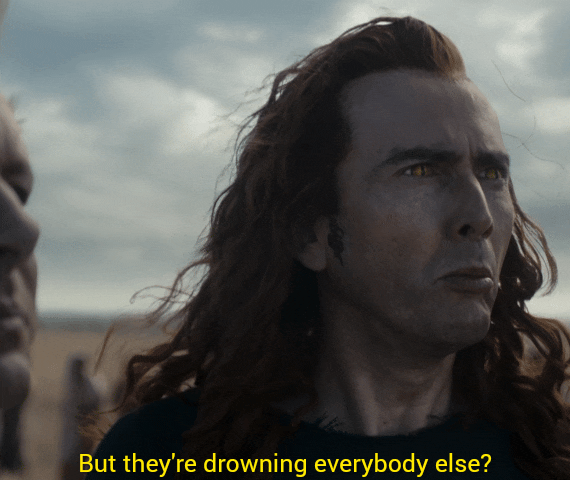
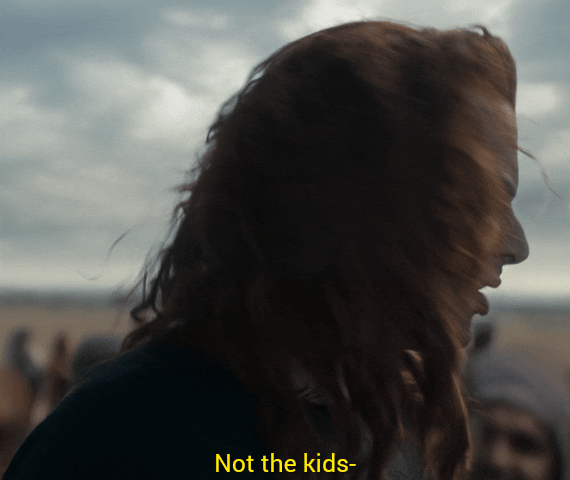

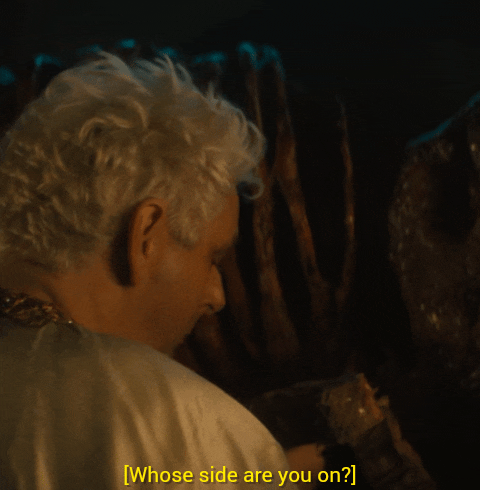
crowley comes across as very innocent and trusting on the wall and in mesopotamia; the sheer act of the flood, and what aziraphale tells him about the motivation behind it, comes as a shock to crowley - now sure, to me, this could say many things, but for me the biggest among them is that he can't believe that after the fall, god would basically pull the same stunt again, and 500-odd years later in uz, he's fully unsurprised by what he considers to be an atrocious act that he's working independently to subvert and resolve (and notable that we see in uz the first in what appears to possibly be becoming a habit - what appears to be displacement onto the goats. whilst it's certainly a defence mechanism, i don't personally consider it to always be a trauma response... but look im not a psychologist).
again, that's not to say that he can't be experiencing trauma alongside this, not at all, but in line to what ive personally come to expect as a result of trauma, i would have personally expected some degree of... resignation? at the flood - 'yeah of course god would do that, why wouldn't she, she's done it before' etc. so again, whilst i don't dismiss the possibility that crowley is traumatised from the fall, it's currently just not quite ringing 100% true to me, not without (imo) the crucial information to give context to why he acts/speaks/behaves as he does. so at the moment, i feel like a good portion of his behaviour stems from realising that god is repeating history, not necessarily the first instance of it (hope that makes sense). and this, i think, feeds into his direct beseechment to god in his flat - again, that god is doing the same thing over and over again, and hasn't learnt.
i definitely take your point re: what the angel who crowley was (AWCW) was like before the fall, and the stark contrast between that and crowley as we know him now. but there is a lot in between those points; not only the fall itself, but the events leading up to it. all we currently know that is he asked questions, and that he hung out/was somewhat in cahoots with lucifer and his gang - i don't think that necessarily occurred in a short space of time after the pre-fall scene; if anything, i do wonder if crowley's fall (especially if we take the revelation about his wings darkening slightly in the pre-fall scene) was a long, drawn-out, and steady process... again, that doesn't mean he can't have been traumatised from it, but there is a heap of context that we're missing that i think will reveal what crowley's state of mind would have been in, in the lead-up to, during, and directly after, the fall.
im personally undecided about how truthful crowley was in the pub scene; i don't think it's inconceivable that, alongside skewing the details of his fall to aziraphale, crowley is capable of fudging the truth somewhat to himself. that's not to say that he deserved to fall, because i don't think that's going to outright be the case, but i do think that it's a possibility that he did something that he has refused to come to terms with or acknowledge, and has told himself half-truths over and over until he potentially believes that to be the truth.
crowley may not outright lie, but he's very good at speaking in riddles, withholding information (sometimes even subconsciously), and dancing around begrudgingly-admitted truths to make himself come across as, frankly, more impressive than he already is. to my mind, AWCW does it in the pre-fall scene, even, so we know it's not strictly crowley-as-a-demon thing:
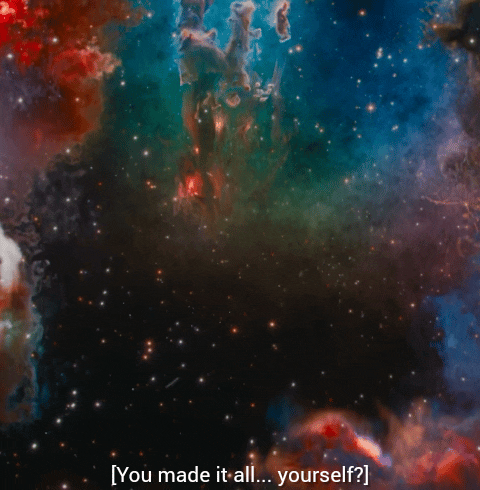
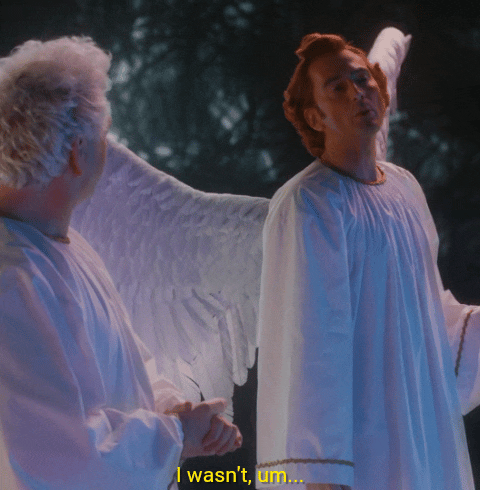
and to me, this comes across in the pub scene too; i don't think crowley believes, in his bladdered state, that he's actually talking to anyone, but he's speaking as if he is, and as such what he divulges is once again danced around and played down. the bit where i think it does become truth is the account of the physical act of falling; that i can believe, because it's the face he pulls, and the way he twists the talisker bottle, that make me think he's actually being truthful here... everything else before it feels like he's playing to an audience (and he doesn't know it, but obviously he is - us!), and that makes me take it with a pinch of salt.
so yeah, totally with you that the physical fall itself probably wrecked some damage (i don't talk much about book!omens - i hold it close to my heart but i see it very separately from tv!omens, i have to admit - but i do think there was some element of playing-it-off in the description of his 'sauntering vaguely downwards', no different to how he tells it to aziraphale in 1862), but i still don't know how much i see it as having traumatised crowley.
to my mind (so, for clarification, this is entirely based on my experience of trauma, and may not be the case for everyone!), trauma takes away a good deal of agency, and i guess idk how much i see crowley without agency in this respect? i completely agree that the fall may have painful, upsetting, and rage-inducing, without a doubt, but does it stem from trauma? that for me is not yet clear!✨
#bear in mind that im trying to answer this without bias from speculation - yk the theory about metatron being behind#all of the things that we are led to believe god is responsible for (and that god isnt a completely amoral entity in all of this)#and the whole memory wipe theory etc#good omens#crowley meta#the fall/the great war spec#ask
12 notes
·
View notes